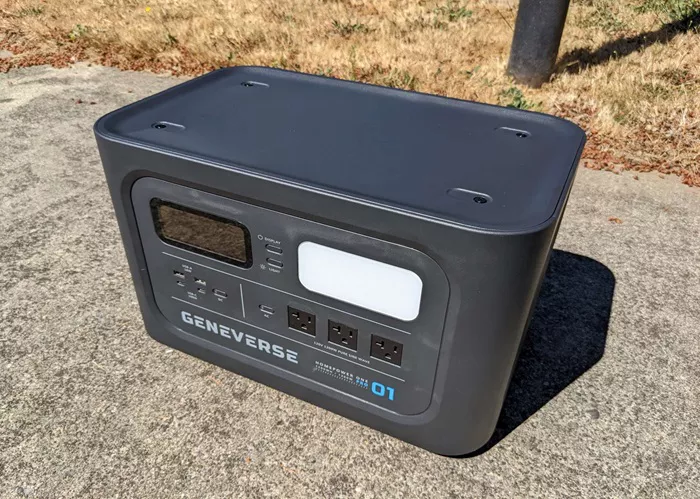Geneverse solar generators are gaining traction in the renewable energy and backup power market. As the demand for clean, portable, and reliable power continues to grow, solar generators like the Geneverse offer a promising solution. This article will cover the types, working principles, pros and cons, storage, maintenance, and buying guides of Geneverse solar generators. It is intended to provide clear and practical insights for anyone considering a Geneverse solar generator for home, outdoor activities, or emergency backup power.
What is a Geneverse Solar Generator?
Geneverse solar generators are portable power stations that convert solar energy into usable electrical power. Unlike traditional fuel-based generators, they rely mainly on solar panels and built-in battery storage to supply electricity. This type of generator is designed to be clean, quiet, and environmentally friendly.
Types of Geneverse Solar Generators
Geneverse offers several models with different power capacities and features. They typically fall into these categories:
- Small Portable Units: These provide around 300 to 500 watts, ideal for charging small devices like phones, laptops, and lights.
- Medium Capacity Units: Offering 600 to 1200 watts, these are suitable for camping, small appliances, and emergency backup.
- High Capacity Units: Ranging from 1500 watts and above, these models can power multiple household devices and some larger equipment.
Each model may come with varying battery types and solar panel options.
Working Principle of Geneverse Solar Generators
Understanding how a solar generator works is key to appreciating its benefits and limitations.
Solar Energy Collection
The generator uses solar panels made of photovoltaic (PV) cells. These cells convert sunlight into direct current (DC) electricity. Solar panels can be attached externally or built into a portable kit.
Battery Storage
The DC electricity generated by the solar panels charges the built-in lithium-ion or lithium iron phosphate (LiFePO4) batteries inside the generator. These batteries store energy for use when sunlight is not available.
Inverter Conversion
To power household or outdoor devices, the stored DC electricity is converted into alternating current (AC) electricity by an inverter. This makes the generator compatible with most electrical devices.
Power Output
The AC output is then supplied via various outlets such as AC sockets, USB ports, and 12V DC ports, allowing multiple devices to be charged or powered simultaneously.
Advantages of Geneverse Solar Generators
1. Clean and Quiet Operation
Unlike gasoline or diesel generators, Geneverse solar generators produce no noise or harmful emissions during operation. This makes them ideal for indoor use, camping, and quiet environments.
2. Renewable Energy Source
By using sunlight, these generators tap into a free and renewable energy source, reducing reliance on fossil fuels and lowering electricity bills.
3. Low Maintenance
Solar generators have fewer moving parts compared to combustion engines, which means less wear and tear and fewer maintenance requirements.
4. Portability and Convenience
Most Geneverse models are designed to be compact and lightweight, making them easy to carry for outdoor activities or emergency situations.
5. Multiple Output Options
They offer various output ports, including AC outlets, USB-A and USB-C ports, and 12V DC outputs, supporting a wide range of devices.
Disadvantages of Geneverse Solar Generators
1. Limited Power Capacity
Solar generators generally cannot match the continuous power output of large fuel generators, limiting their use for heavy-duty appliances like air conditioners or large power tools.
2. Dependence on Weather
Their charging efficiency depends heavily on sunlight availability. Cloudy days or indoor use without an alternative charging method can limit performance.
3. Higher Initial Cost
The upfront investment for solar generators is typically higher than traditional generators, although operational costs tend to be lower.
4. Battery Lifespan
Batteries degrade over time and with frequent cycling. Eventually, they require replacement, which adds to long-term costs.
Storage and Maintenance Tips for Geneverse Solar Generators
Proper storage and maintenance can extend the life and reliability of a Geneverse solar generator.
Storage Guidelines
- Store the generator in a cool, dry place away from direct sunlight when not in use.
- Keep the battery charged at around 50-70% if the generator will be stored for extended periods. Avoid fully draining or fully charging batteries for long-term storage.
- Disconnect any attached solar panels or cables to prevent unnecessary battery drain.
Maintenance Tips
- Regularly clean solar panels with a soft cloth and mild detergent to ensure maximum efficiency.
- Check battery health periodically using any diagnostic tools provided.
- Inspect cables and connectors for damage or corrosion.
- Avoid overloading the generator beyond its rated capacity to prevent damage.
How to Choose a Geneverse Solar Generator
Choosing the right Geneverse solar generator depends on your specific power needs and usage scenarios.
1. Assess Your Power Requirements
List the devices you plan to power. Calculate their total wattage and expected run time to estimate the generator size you need.
2. Consider Battery Capacity
Look at the watt-hour (Wh) rating of the battery. A higher Wh means longer power availability but usually a larger and heavier unit.
3. Check Solar Panel Compatibility
Determine if the generator comes with built-in panels or if you need to buy external panels. Make sure the panel wattage matches your charging needs.
4. Portability
If you plan to use the generator outdoors or travel frequently, opt for lighter and more compact models.
5. Additional Features
Look for extra features like fast charging, multiple output ports, LCD display, or smartphone app control for convenience.
Conclusion
Geneverse solar generators provide an eco-friendly and reliable alternative to traditional fuel generators. They are particularly suited for users who value quiet, clean energy and portability. While they have some limitations in power capacity and weather dependence, their benefits in ease of use and low maintenance make them a strong choice for camping, emergency power, and everyday small device charging.
By understanding their working principles, advantages, and maintenance needs, you can make an informed decision about whether a Geneverse solar generator fits your energy needs.

